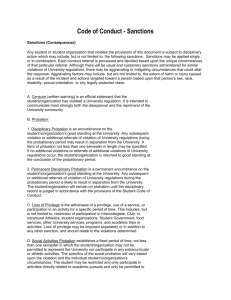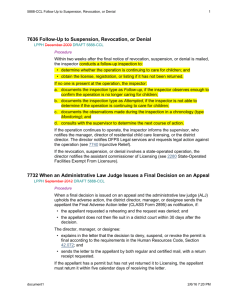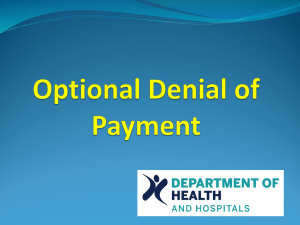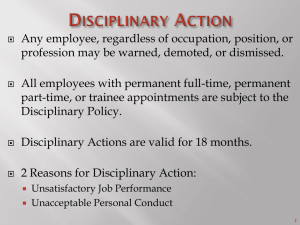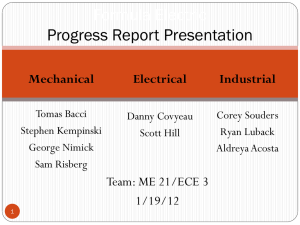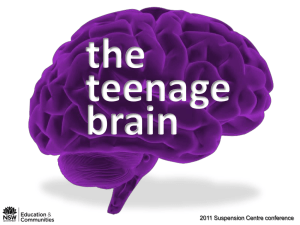Conduct of Student Organizations
advertisement
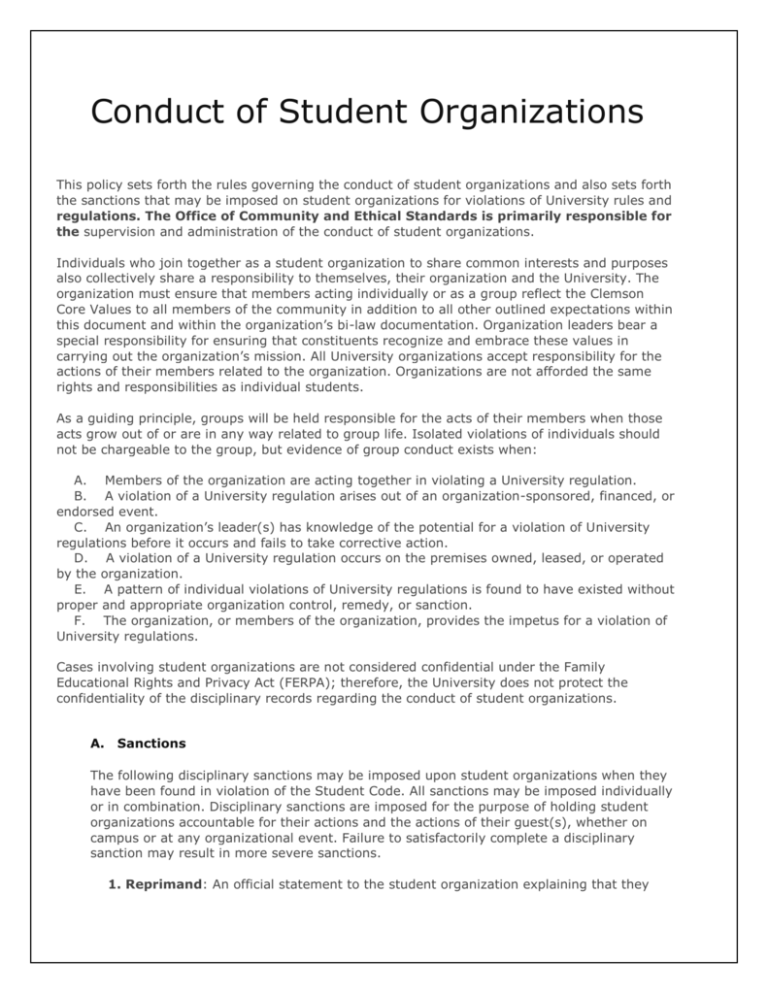
Conduct of Student Organizations This policy sets forth the rules governing the conduct of student organizations and also sets forth the sanctions that may be imposed on student organizations for violations of University rules and regulations. The Office of Community and Ethical Standards is primarily responsible for the supervision and administration of the conduct of student organizations. Individuals who join together as a student organization to share common interests and purposes also collectively share a responsibility to themselves, their organization and the University. The organization must ensure that members acting individually or as a group reflect the Clemson Core Values to all members of the community in addition to all other outlined expectations within this document and within the organization’s bi-law documentation. Organization leaders bear a special responsibility for ensuring that constituents recognize and embrace these values in carrying out the organization’s mission. All University organizations accept responsibility for the actions of their members related to the organization. Organizations are not afforded the same rights and responsibilities as individual students. As a guiding principle, groups will be held responsible for the acts of their members when those acts grow out of or are in any way related to group life. Isolated violations of individuals should not be chargeable to the group, but evidence of group conduct exists when: A. Members of the organization are acting together in violating a University regulation. B. A violation of a University regulation arises out of an organization-sponsored, financed, or endorsed event. C. An organization’s leader(s) has knowledge of the potential for a violation of University regulations before it occurs and fails to take corrective action. D. A violation of a University regulation occurs on the premises owned, leased, or operated by the organization. E. A pattern of individual violations of University regulations is found to have existed without proper and appropriate organization control, remedy, or sanction. F. The organization, or members of the organization, provides the impetus for a violation of University regulations. Cases involving student organizations are not considered confidential under the Family Educational Rights and Privacy Act (FERPA); therefore, the University does not protect the confidentiality of the disciplinary records regarding the conduct of student organizations. A. Sanctions The following disciplinary sanctions may be imposed upon student organizations when they have been found in violation of the Student Code. All sanctions may be imposed individually or in combination. Disciplinary sanctions are imposed for the purpose of holding student organizations accountable for their actions and the actions of their guest(s), whether on campus or at any organizational event. Failure to satisfactorily complete a disciplinary sanction may result in more severe sanctions. 1. Reprimand: An official statement to the student organization explaining that they have violated a University regulation. Any further misconduct could result in additional disciplinary action. 2. Restitution: When an organization has damaged or destroyed University or personally owned property the organization may be required to make restitution, or receive additional educational sanctions. 3. Restriction of Privileges: Restrictions placed upon a student organization which limits University privileges for a specified period of time. These limitations may include, but are not limited to, the following: a. Denial to represent the University in any capacity. b. Denial to maintain an office or other assigned space on University property. c. Denial to receive or retain University funds. d. Denial to participate in intramural sports. e. Denial to sponsor, co-sponsor and/or participate in any social event or other activity. f. Denial to sponsor any speaker or guest on campus. g. Denial of rush or membership recruitment activities. h. Denial of the request for block seating at University events. i. Denial of the use of University vehicles. j. Denial of the use of University facilities. k. Denial of advertising on campus for organizational activities. l. Denial of soliciting and/or selling any items on campus. 4. Disciplinary Probation: A specified period of review, observation and/or restrictions during which a student organization is under official warning that its misconduct was very serious. Subsequent violations of University rules, regulations, or policies could result in more severe sanctions, including suspension or dismissal of recognition. During the probationary period, a student organization is deemed “not in good standing” with the University and may be subject to specific limitations upon its behavior or University privileges. 5. Suspension of Organizational Recognition: The denial of privileges of a recognized organization for a designated period of time, which will be no less than one semester. Any organization whose recognition is suspended must: a. Cease all organizational activities. b. Vacate any appointed or elected office with that organization’s governing body for the duration of the organization’s period of suspension. c. Surrender balances of all organizational funds granted by Student Government. d. Vacate office or housing space assigned by the University from the date of the notice of suspension. Space vacated due to suspension may be reassigned to other eligible University organizations. In the case of housing, individual members will be reassigned provided space is available. There will be no University Housing contract cancellations. 6. Dismissal of Organizational Recognition: Permanently excludes the organization from the University without any recourse to reapply for recognition. Any organization whose recognition is permanently revoked must: a. Cease all organizational activities. b. Vacate any appointed or elected office. c. Surrender balances of all organizational funds granted by Student Government. d. Vacate office or housing space assigned by the University from the date of the notice of dismissal. Space vacated due to dismissal may be reassigned to other eligible University organizations. In the case of housing, individual members will be reassigned provided space is available. There will be no University Housing contract cancellations. 7. Interim Suspension of Organizational Recognition: An interim suspension may be imposed, by the vice president for Student Affairs or his/her designee, prior to the beginning of the administrative process. The interim suspension may be imposed in cases where: a. The alleged action of the student organization may pose a threat to the well-being of the University or any of its members, or to preserve University property; b. The student organization poses a threat of disruption or interference with the normal operations of the University. During any interim suspension, the organization shall be required to discontinue with all organizational activities. The organization will be denied access to all University activities and privileges for which the organization might be eligible. In certain circumstances, organizational leadership may be restricted from communication with the organizational membership or students may be required to vacate organizational housing units. Prior to imposing an interim suspension, every effort will be made to give the student organization an opportunity to respond to the charge(s). Following the imposition of an interim suspension, the opportunity for an administrative hearing as described above will be provided as expeditiously as possible but no later than fifteen university working days after the interim suspension unless the student organization waives the time deadline or there are extenuating circumstances. B. Student Organization Discipline Procedures The Director of Community and Ethical Standards or his/her designee will investigate all allegations of student organization misconduct. The investigation will include interviewing those individuals with information about the incident and meeting with the appropriate officers of the organization. The Director shall have the authority to do the following: 1. Institute all sanctions except suspension or dismissal. 2. Refer the student organization to an administrative hearing. 3. Schedule an administrative hearing for the referred student organization in cases where the contemplated sanction is suspension or dismissal of recognition, unless the student organization waives its right to a hearing. The notice of an administrative hearing, the procedure during an administrative hearing and the appeal process of an administrative hearing will follow the same format as described in the section F. 3. Administrative Hearings. If the student organization waives its right to a hearing, the recommended sanction will be imposed. C. Student Organization Major Incident Response Plan In the event an incident occurs involving a student organization and it is necessary to meet with a large number of the student members, an emergency meeting will be scheduled and interviews will be held. In order to meet with the members in a timely manner, representatives from OCES, University Housing, Gantt Center for Student Life, Fike Recreation and/or the Dean of Students Office will be contacted to assist with the interviews. The types of incidents that may fall under this protocol include, but not limited to: • • • Major Hazing Cases Major Alcohol Cases Major Disorderly Conduct Cases An OCES staff member or designee will be responsible for coordinating the date, place and time and contacting the President and/or vice president of the student organization. It is the responsibility of the President and/or vice president to ensure that all members be in attendance unless there are extenuating circumstances. OCES will also arrange to have staff members from Counseling and Psychological Services on call and/or present for incidents where student organizational members are experiencing a tragic or critical event and are in need of counseling. XII. Student Conduct Code Review Committee SCCRC will be responsible for reviewing annually, the Student Code of Conduct and recommending changes to the vice president for Student Affairs and may also review, upon written request of students or University entities, other University policies affecting students to determine if those policies are consistent with the philosophy and intent of the Student Conduct Code. SCCRC will also review appeals submitted by students found in violation during the administrative discipline process. 1. The members of SCCRC shall be: a. Two faculty members appointed by the Faculty Senate b. Two staff members appointed by the Staff Senate c. Five full time enrolled students in good standing appointed in the following manner: i. One undergraduate student appointed by the Student Government President, one undergraduate student appointed by the Student Senate president and one undergraduate student appointed by the Student Attorney General. ii. One graduate student appointed by the Graduate Student Government President and one graduate student appointed by the Graduate Student Senate President. 2. The Director of Community and Ethical Standards or his/her designee shall serve as the non-voting executive secretary to SCCRC. Faculty and staff members will be appointed for three-year staggered terms. Students will be appointed as needed. Approved by Board of Trustees 10/19/12 Contact: Office of Community and Ethical Standards, 912 University Union, 864-656-0510
